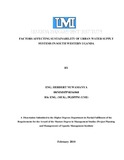Factors Affecting Sustainability of Urban Water Supply Systems in South Western Uganda
Abstract
This study examined factors affecting sustainability of urban water supply systems in South Western Uganda. Five objectives were set, namely: to examine the effect of age on sustainability, establish the influence of technology on sustainability, assess the impact of social-political dynamics on sustainability, to assess the effect of use of alternative water sources on sustainability, and to establish the relationship between affordability and sustainability. Data on five independent variables of system age, technology, social-political dynamics, affordability and use of alternative water sources and the dependent variable (sustainability) were collected from 16 water systems through documentary review, observation and interviewing at least 30 respondents (comprised of operators, board members and representatives from consumers) from each of the water supply systems. The data was summarised and analysed using frequency distributions, correlation and regression analysis, independent samples t-test and one way ANOVA. The study established that sustainability of urban water supply systems in South Western Uganda is an issue that requires urgent attention and that sustainability; is negatively affected by the age of the system, is influenced by the technology options adopted in the design of the system, is significantly negatively impacted by the social-political dynamics (population growth and conflicts) of a given area have, is significantly and positively related to affordability of the service, and is negatively affected by the use of alternative water sources. The study recommends seasonal monitoring of water source yields, use of a more comprehensive tool of measuring sustainability of water supply systems, continuous implementation of strengthened capacity building programs (that include conflict resolution) during the entire life of the system, timely resolution of conflicts, addressing the triggers of use of alternative water sources, further studies involving more towns and other regions and a study on water consumption pattern with a view of revising the per capita per day consumption rate used in water supply designs given the rampant under utilization of installed capacities.

